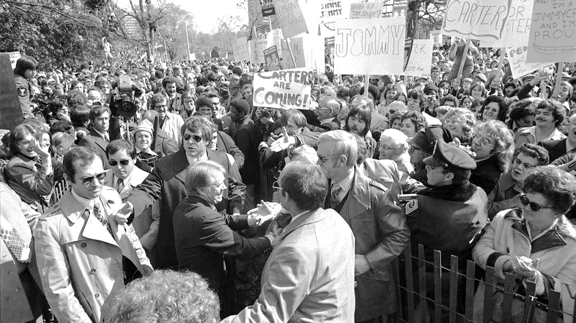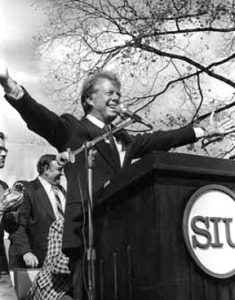by Pete Rosenbery
CARBONDALE, Ill. — Although he spent just four years in the White House and his humanitarian works after leaving office are widely applauded, Southern Illinois University Carbondale political experts say former President Jimmy Carter’s legacy includes significant and impressive successes while in office.
John Shaw and John Jackson of the Paul Simon Public Policy Institute point toward Carter’s efforts in brokering a peace between Israel and Egypt that continues today, creating the Department of Education and Department of Energy and pioneering work regarding climate change among a list of accomplishments. Carter died Dec. 29 at 100 years old, more than a year after the death of his wife, former first lady Rosalynn Carter. Services to honor the former president will be held in Georgia and Washington, D.C., from Saturday, Jan. 4, through Thursday, Jan. 9.
While Carter’s presidency from 1977 to 1981 was “both consequential and troubled,” Shaw, the Paul Simon Institute’s director, believes history will treat Carter “kindly.”
“He will be remembered as a good president, a great former president and an extraordinary human being — one of the most decent and honorable men to ever reside in the White House,” Shaw said.
Jackson, a visiting professor with the institute, said most tributes to Carter focus on his humanitarian work after he left the White House, but “there is a growing recognition of the far-sighted accomplishments of his one term as president.”
“Carter made protecting the environment a major issue and pioneered federal policies to address climate change,” Jackson said. “He personally negotiated the Camp David Accords, which brought peace between Israel and Egypt, a peace which is crucial today. He normalized relations with China which emphasizes competition over direct conflict today. He grew up in the segregated Deep South yet put civil rights and the appointment of African Americans to high offices as major commitments of his administration.”
At the same time, Kenneth Mulligan, associate professor in political science, noted that that “runaway inflation, gas shortages and the Iranian hostage crisis are just a few of the reasons why Carter’s presidency ended in one of biggest electoral college losses in American history. However, Carter and the press did a lot since then to rehabilitate his image.”
Mulligan added the country continues to face issues that confronted Carter during his administration.
“From Iran to inflation to the Panama Canal, the issues and policies Jimmy Carter wrestled with are as relevant today as ever,” he said.

Then-Democratic presidential candidate Jimmy Carter meets supporters during a campaign stop at SIU Carbondale on Oct. 26, 1976, just one week before the election. Carter spoke with supporters in the free forum area near the Student Center, with many spectators sitting in trees and watching from the nearby parking garage that was there at the time. (Photos from Morris Library Special Collections Research Center)
Visit to SIU Carbondale
Carter defeated President Gerald Ford in November 1976, making the former Georgia state senator and governor then country’s 39th president. Carter campaigned at SIU Carbondale in October 1976, just one week before the Nov. 2, 1976, election.
Shaw added that Carter was able to secure Senate approval of the Panama Canal treaties in 1977, which guaranteed Panama would assume custody of the canal in 1999 after nearly 100 years of U.S. control, and brokered the Camp David Accords in September 1978, the framework for the 1979 peace treaty between Israel and Egypt.
Shaw and Jackson also pointed to events that overwhelmed successes of Carter’s presidency — the “stringent economic steps” in the United States to fight inflation that Carter inherited, OPEC gasoline price increases and geopolitical issues, including the Soviet Union’s invasion of Afghanistan and the Iranian hostage crisis that began in November 1979.

Humanitarian work recalled
Jackson noted Carter was widely known after leaving office for his work on world health issues, eradicating tropical diseases, protecting free and clean elections abroad and Habitat for Humanity, where he and his wife helped build homes into their 90s. Carter “put his deep religious faith at the center of his public and private life,” said Jackson, adding that like former President Harry Truman, “history will be much more positive about Carter’s record as president than public opinion was then.”
Carter’s work after leaving the White House is something for others to emulate, Shaw added, noting Carter received the 2002 Nobel Peace Prize.
“Jimmy Carter created an impressive model for former American presidents, showing how they can be important and productive global leaders long after they leave the White House,” Shaw said. “The Carter Center has done remarkable work to promote human rights. Most Americans felt great pride when Jimmy Carter won the Nobel Peace Prize in 2002. It was richly deserved.”
